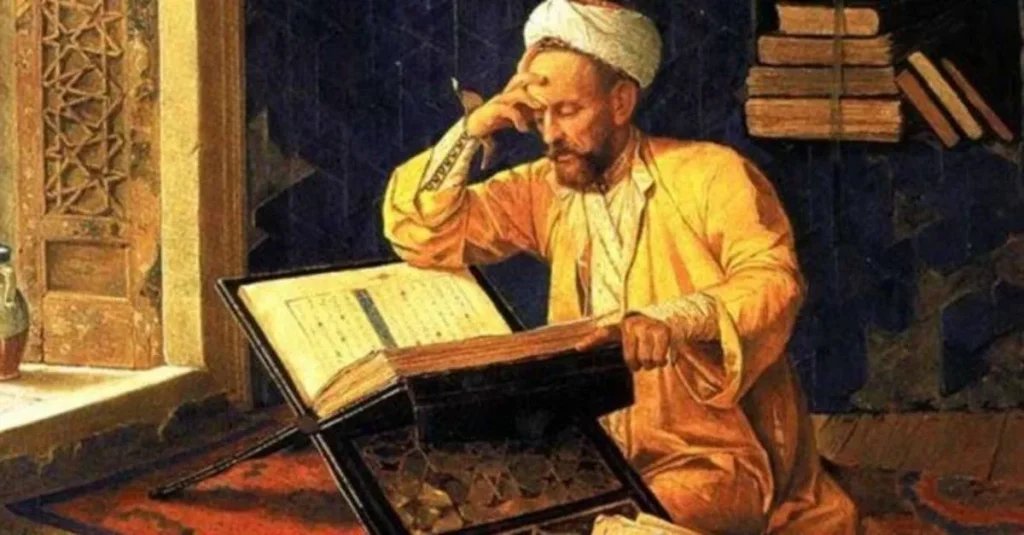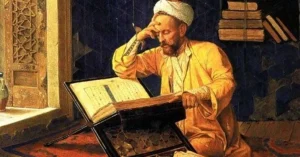
A of portrait of Imam Al-Ghazali
Final Thoughts: Al-Ghazali’s Timeless Legacy
Imam Al-Ghazali (رحمه الله) left an enduring mark on Islamic thought, spirituality, and ethics [1]. His works remain relevant.
He harmonized reason, revelation, and moral guidance. Knowledge, ethics, and spirituality were inseparable in his teachings [2].
Al-Ghazali’s Ihya’ Ulum al-Din continues to guide scholars, students, and spiritual seekers worldwide [1]. Reflection and sincerity are key lessons.
His integration of philosophy, jurisprudence, and Sufism shaped Islamic education. Students learn intellectual depth and ethical awareness [3].
Al-Ghazali emphasized moral grounding in every pursuit. Knowledge without virtue is incomplete and spiritually hollow [2].
Modern scholars and practitioners continue to draw inspiration from his principles. His teachings address ethical and spiritual challenges today [1].
In essence, Al-Ghazali’s legacy is timeless. His life exemplifies devotion to knowledge, piety, and ethical living for all generations [3].
References:
- Al-Ghazali, Ihya’ Ulum al-Din, 11th century.
- Fakhry, Majid, A History of Islamic Philosophy, Columbia University Press, 2004.
- Hourani, George, Islamic Thought in the Classical Age, Cambridge University Press, 1983.
Appendices
The appendices provide additional context on Imam Al-Ghazali (رحمه الله) and his works [1]. They clarify historical details.
One section lists his major writings. These include Ihya’ Ulum al-Din, Tahafut al-Falasifa, and numerous theological and philosophical treatises [2].
Another section outlines his influence on Islamic education. His methods shaped curricula in madrasas and Islamic universities [1].
There is also a timeline of his life. Key events, travels, and scholarly achievements are highlighted [3].
The appendices include summaries of his main philosophical and spiritual teachings. Ethics, self-purification, and reasoning are emphasized [2].
Biographical notes on his teachers and contemporaries provide insight into his intellectual environment [1]. These notes help understand his development.
Glossaries and explanations of technical terms clarify complex concepts. Students and readers can better grasp his ideas [3].
In essence, the appendices serve as a reference and guide. They complement the main chapters, enriching understanding of Al-Ghazali’s life and works [2].
References:
- Al-Ghazali, Ihya’ Ulum al-Din, 11th century.
- Fakhry, Majid, A History of Islamic Philosophy, Columbia University Press, 2004.
- Hourani, George, Islamic Thought in the Classical Age, Cambridge University Press, 1983.
Selected Quotes by Imam Al-Ghazali
Al-Ghazali emphasized self-reflection: “He who knows himself, knows his Lord” [1]. This teaches inner awareness.
He highlighted the importance of knowledge: “Knowledge without action is wastefulness” [2]. Learning must lead to practice.
On sincerity, he said: “Purity of intention is the foundation of every deed” [1]. Ethical motives guide life.
He warned against arrogance: “Do not be proud of your knowledge, but of your piety” [3]. Humility is essential.
Regarding time and life, he wrote: “The heart dies when the tongue speaks idle words” [2]. Mindful speech preserves the soul.
He emphasized patience: “Endure trials with wisdom; hardships refine the heart” [1]. Challenges teach resilience.
Al-Ghazali advised spiritual balance: “Do not neglect worldly duties while pursuing divine knowledge” [3]. Integration of life and faith is key.
These selected quotes reflect his timeless wisdom. They guide ethics, spirituality, and personal growth across generations [2].
References:
- Al-Ghazali, Ihya’ Ulum al-Din, 11th century.
- Fakhry, Majid, A History of Islamic Philosophy, Columbia University Press, 2004.
- Hourani, George, Islamic Thought in the Classical Age, Cambridge University Press, 1983.
Bibliography of Works by and about Imam Al-Ghazali
This section lists key works authored by Imam Al-Ghazali (رحمه الله). His writings shaped Islamic thought [1].
Major Works by Imam Al-Ghazali:
- Ihya’ Ulum al-Din – A comprehensive guide on ethics, spirituality, and religious practice [2].
- Tahafut al-Falasifa – A critical analysis of philosophers, emphasizing faith over pure reason [1].
- Al-Munqidh min al-Dalal – An autobiographical account detailing his spiritual awakening and doubts [2].
- Numerous treatises on theology, jurisprudence, and Sufism [1].
Selected Works About Al-Ghazali:
- Fakhry, Majid, A History of Islamic Philosophy, examines his philosophical influence [3].
- Hourani, George, Islamic Thought in the Classical Age, provides historical context of his contributions [3].
- Makdisi, George, The Rise of Colleges, discusses his role in Islamic educational institutions [2].
These sources highlight his intellectual breadth. They provide insights into his philosophy, spirituality, and enduring legacy [1].
Scholars and students use this bibliography as a reference guide. It helps locate primary texts and critical studies [2].
Al-Ghazali’s works continue to be translated, analyzed, and studied worldwide. His influence spans centuries [3].
References:
- Al-Ghazali, Ihya’ Ulum al-Din, 11th century.
- Fakhry, Majid, A History of Islamic Philosophy, Columbia University Press, 2004.
- Hourani, George, Islamic Thought in the Classical Age, Cambridge University Press, 1983.
Discussion of Imam Al-Ghazali’s Impact on Modern Thought
Al-Ghazali’s ideas continue to influence contemporary Islamic thought. His integration of philosophy, theology, and Sufism remains relevant [1].
Modern scholars appreciate his approach to ethics. He emphasized moral responsibility alongside knowledge and reasoning [2].
In education, Al-Ghazali’s works inspire curricula in Islamic studies. His emphasis on self-reflection shapes modern teaching methods [3].
Philosophers value his critique of pure reason. Tahafut al-Falasifa challenged blind rationalism, highlighting faith and intuition [1].
His spiritual writings encourage balance between worldly duties and divine pursuits. This resonates with modern audiences seeking ethical guidance [2].
Al-Ghazali also impacted interfaith and philosophical discourse. His works are studied in comparative religion and philosophy programs globally [3].
Modern psychology and personal development fields draw on his teachings about the self, intention, and ethical living [1].
Overall, Al-Ghazali’s legacy bridges medieval Islamic thought and contemporary intellectual inquiry. His insights remain influential worldwide [2].
References:
- Imam Al-Ghazali, Ihya’ Ulum al-Din, 11th century.
- Fakhry, Majid, A History of Islamic Philosophy, Columbia University Press, 2004.
- Hourani, George, Islamic Thought in the Classical Age, Cambridge University Press, 1983.






